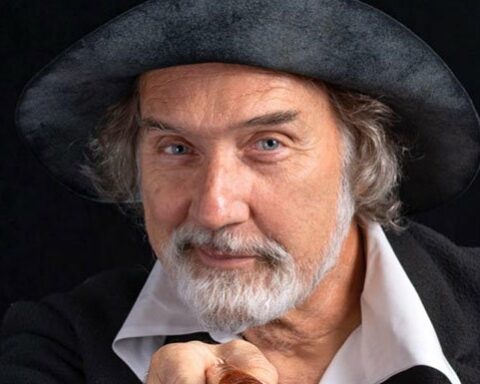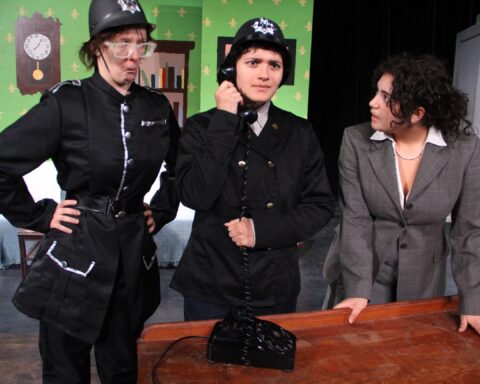
viewed 03/07/19
Before the doors leading into the CenterStage open at the ’62 Center for Theatre and Dance, audience members waiting to see The Last Days of Judas Iscariot are invited to form lines behind three candle-bearers. We are led into a solemn scene lit by a single streetlight, where we stand before a woman who is mourning the death of her child. Another figure sits behind her at a quiet distance. The mother talks about her own pain and the shock of losing a grown son coupled with the excruciating memory of how alone he was in the end. Is this Mary, mother of Jesus?
No. It is Henrietta Iscariot, mother of Judas Iscariot. And with that, we are swept into a world that offers sympathy for Judas, the betraying villain of the Christian story of Jesus’s death. Because even Judas had a mother; even Judas was once a child.
Written by Pulitzer Prize–winning playwright Stephen Adly Guirgis, the story takes place in the courtroom of purgatory with a cast of characters hailing from several different eras. Fabiana Aziza Cunningham, played strikingly by Maya Jasinska, is a feisty lawyer intent on rescuing Judas from hell and sending him to an eternity in heaven. The crusty Judge Littlefield (Noah Savage) is vehemently against hearing the case until Saint Monica (Onyeka Obi) intervenes and coerces God to sign a writ. Cunningham faces off with Yusef El-Fayoumy (Samori Etienne), an obsequious and flirtatious lawyer who is primarily interested in doing what pleases the judge.
The Last Days of Judas Iscariot
Williams College Theatre Department
’62 Center for Theatre and Dance
1000 Main Street, Williamstown, Mass.
Thursday, March 7th to Sunday, March 10th. Performances will be in the CenterStage at 7:30 p.m. and 2:00 p.m. on Saturday.
Tickets are $3.
The trial spins through an array of historical figures from Mother Teresa and Sigmund Freud to Pontius Pilate and Caiaphas the Elder. Some appear on the witness stand while others testify about their relationship with Judas or stage a memorable scene from his past. Director Shadi Ghaheri maintains a steady pace between long, detailed monologues and sudden bursts of humor. If you don’t know this play is going to be a roller coaster when Gloria (Onyeka Obi) lights up the stage in a sequin-bedazzled jumpsuit and no-holds-barred street language, you’re sure of it by the time the innocent-looking Satan (Mira Sneirson) is conjured to the witness stand, forcing everyone into a puppet-like dance.
As each character is questioned, we realize that the story of Jesus’s death has vast elements that we can’t understand, whether it’s because the facts have been lost in history, because those closest to Judas were using him to hide their own faults, or simply because, as with all human relationships, we can never truly know the intent of someone else’s heart.

The performers, all Williams College students, are exceptional at delivering huge reams of dialogue with no missteps, and the witness stand format allows each actor to shine. Etienne plays El-Fayoumy brilliantly, painting a picture of a swaggering chauvinist with hidden insecurities and hitting every comic line perfectly. Onyeka Obi plays three parts: Gloria, Saint Monica, and Jesus Christ. In each, her commanding presence wrenches the audience’s preconceived notions about the crucifixion away from them. Peter Matsumoto’s Judas is more than an ethereal presence: his thin, slouched form is at the edge of many scenes in which he has no lines—almost as if his thoughts aren’t integral to the story—but he so masters the art of Judas’s personality through his posture and nearly unnoticeable gestures that your eye is drawn to him nonetheless. This has the emotional effect of a nagging doubt, a depression you can’t shake, or an insecurity that won’t go away on your most confident days. When he speaks, his voice is powerful and clear, sad and angry, desperate for your forgiveness—and aching to forgive himself.
This three-hour play with a ten-minute intermission may be a test of endurance for some, especially those who choose to sit on the backless benches. Some of the monologues feel unnecessarily long, though they made me wish I had taken more courses in biblical history. At the moment your mind might wander, however, you may be called back with a sudden bang of the gavel or the dramatic entrance of Satan. If you are Christian or have that religious affiliation in your history, you may flinch at the R-rated language when the characters talk about Jesus Christ; but if you remember that a nun isn’t going to pop out and rap your knuckles, you’ll probably get used to the idea that these are meant to be people who knew a Jesus that walked among them. You will undoubtedly leave the theater with more questions than you arrived with.
















You must be logged in to post a comment.